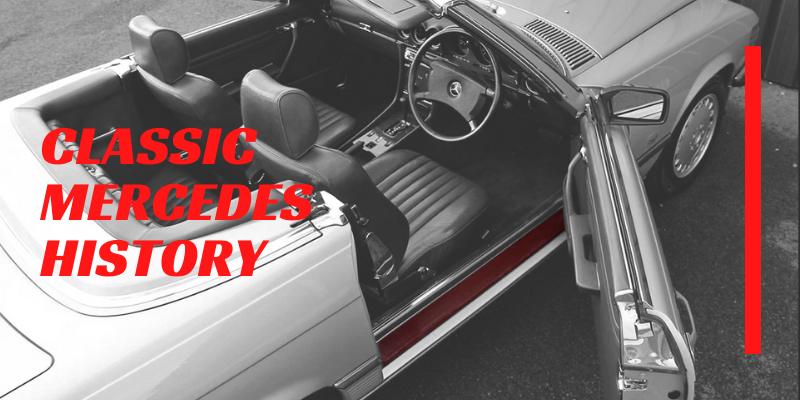Classic Mercedes History and Chassis Numbers

Mercedes-Benz
Mercedes-Benz was founded in 1926 with the merger of Benz & Cie and Daimler Motoren Gesellschaft in Stuttgart, Germany.
Where does the Mercedes-Benz name come from?
Emil Jellinek, Australian merchant and also Consul General of Nice, Austria; Daimler bought a car from the factory. The popularity of Daimler vehicles, which became synonymous with the Mercedes name began to increase in 1899, when a Daimler-produced vehicle equipped with higher horsepower was named "Mercedes" which was the name of his eldest daughter. He won first places in the races he participated in with this vehicle. Continuing to win the race, Emil Jellinek; ordered 36 cars from Daimler and required these vehicles to bear the Mercedes name.
After this success and popularity, Daimler decided to name the vehicles it produced in 1901 as "Mercedes".
The word Mercedes means Mars in Spanish. It also means grace and elegance.
On June 23, 1902, Mercedes took the patent and registration of the name and proceeded with this name.
The story of the Mercedes-Benz Emblem
Carl Benz, founder of Benz & Cie; in the letters he put on the top of his house and wrote to his wife, he stated that he would shine on the factory he would establish one day. It was successful in its passion, and today that star emblem continues to be symbolized in front of vehicles produced all over the world.






Mercedes-Benz models
Automobiles
A Class
B Class
C Class
CL Class
CLA Class
CLC Class
CLK Class
CLS Class
E Class
G Class
GL Class
GLA Class
GLB Class
GLC Class
GLE Class
GLK Class
GLS Class
M Class
R Class
S Class
Maybach
SL Class
SLC Class
SLK Class
SLS AMG Class
AMG GT Class
V Class
Light Commercial Vehicles
Sprinter
Vario
Vito
Viano
Citan
Trucks
Atego
Axor
Actros
Minibus/Minivan
Conecto
CapaCity
Citaro
Citaro LE
Buses
Travego
Tourismo
Intouro
Tourismo K
Tourismo RH
Integro
Mercedes-Benz Chassis Numbers
A-Class
- W168
- W169
B-Class
- W245
- W246
C-Class
- W202
- W203
- W204
- W205
CL-Class
- C140
- C215
- C216
CLA Class
- C117
- C118
CLC Class
- W204
CLK Class
- W208/C208
CLS Class
- C219
- C218
- C257
E Class
- W124
- W210
- W211
- W212
- W213
G Class
- W460
- W461
- W463
GL Class
- X164
GLA Class
- X156
- H247
GLB Class
- X247
GLC Class
- X253/C253
GLE Class
- W163
- W164
- W166
- W167
GLK Class
- W204
GLS Class
- X164
- X166
- X167
M Class
- W163
- W164
- W166
- W167
R Class
- W251
S Class
- W108
- W109
- W166
- W126
- W140/C140
- W220
- W221
- W222/C217/A217
- W223
Maybach
- W108
- W116
- W222
SL Class
- W198/W121
- W113
- R107
- R129
- R230
- R231
SLC Class
- R107
- R172
SLK Class
- R170
- R171
- R172
SLS AMG Class
- C197
- R197
AMG GT Class
- C190/R190
V Class
- W638
- W639
- W447
Vehicles that have passed 20 years over the average production date can be described as classic vehicles. Today, Mercedes vehicles have their own classic mercedes market. Many parts that are not produced by the factory continue to be produced by classic-lover manufacturers.
As Bamboli, we attach great importance to classic mercedes parts and continue to supply collectors and all classic mercedes lovers with products with great care and craftsmanship.
-
Posted in
Classic Mercedes




